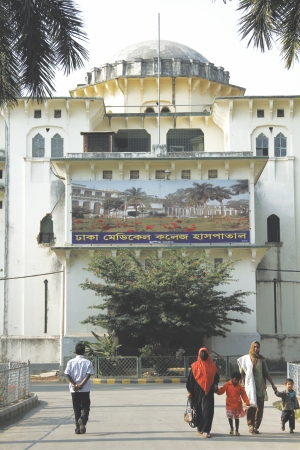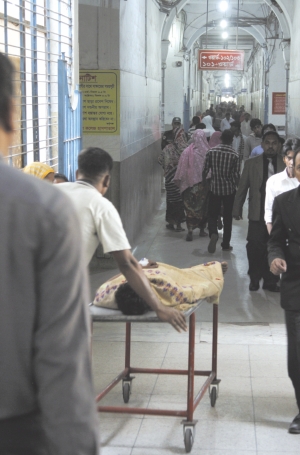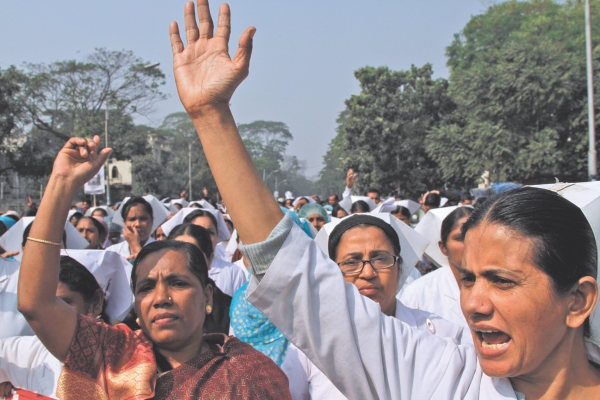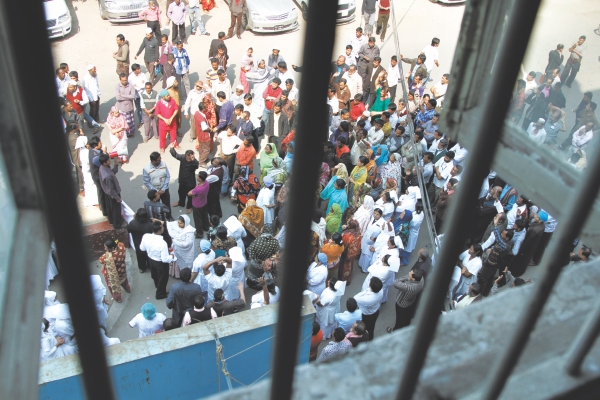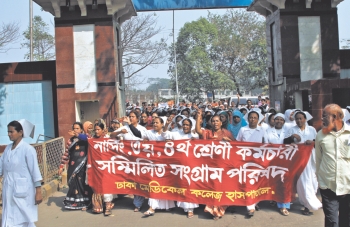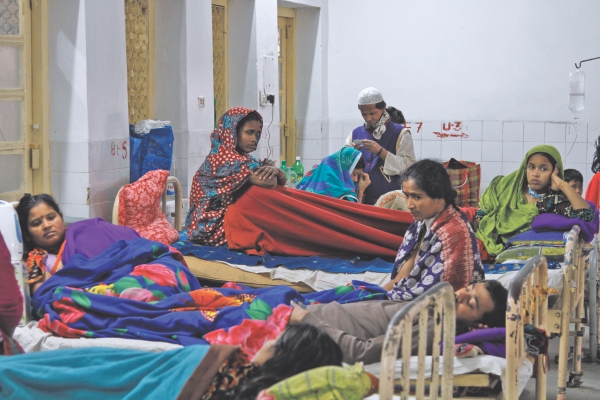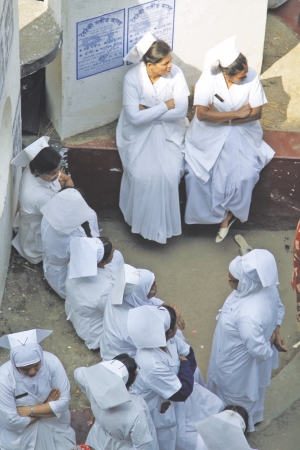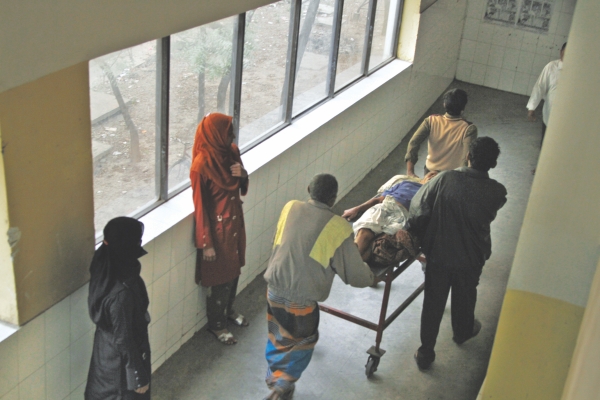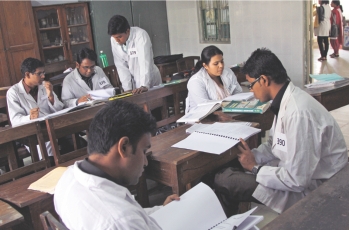| Home - Back Issues - The Team - Contact Us |
 |
| Volume 11 | Issue 07 | February 17, 2012 | |
|
|
Cover Story Anatomy of the Autonomous Body Change is in the air in the biggest medical college hospital of the country. But is the change really for the best? As the government announced the decision to turn Dhaka Medical College and Hospital into an autonomous university, a surge of protests erupted at the college premises. Different stakeholders posit different opinions on the proposed move, but there is a reigning fear that DMCH will cease to be an accessible and affordable institution. Sushmita S Preetha
Dhaka Medical College and Hospital brings to mind a myriad of not-so-positive images – inadequate staff, overcrowded halls, shortage of supplies, chaos and mismanagement. Yet, every day around 3,500 patients come to Dhaka Medical College and Hospital (DMCH), hoping to receive some form of treatment and care. For most of these patients, the DMCH is the place of last but hopeful resort. Despite the irregularities, unhygienic practices and medical negligence that have become synonymous with the DMCH, it remains the most accessible healthcare facility for people all over Bangladesh who cannot afford the luxuries of private hospitals. As the biggest public medical facility in the city, it provides treatment to patients from different walks of life, irrespective of their financial background. People from remote corners of the country are transferred to DMCH from both private and public medical institutions on a daily basis. It accommodates patients well beyond its official capacity, with only 1,700 beds and about 234 doctors, 140 interns and 560 nurses. “It's a miracle that they manage to treat all the patients with the resource constraints that they have,” comments Rehman Sharkar, whose sister is undergoing cancer treatment at the hospital. Sharkar says that he is amazed at the sheer volume of patients that the hospital treats every day for free. Since its inception in 1946, Dhaka Medical College has played an indispensable role in the development of medical science and healthcare services. It is the oldest and most esteemed medical educational institution in the country, producing some of Bangladesh's most brilliant medical minds. Each year, thirty-six thousand applicants sit for the medical college examination exam, but only the top 180 students are admitted. Currently, there are 1100 MBBS students in DMCH. Although there are 39 postgraduate programmes in the college for 900 post graduate students, and short-term training courses, the focus of DMCH remains its renowned undergraduate programme.
On January 17, 2012, the Prime Minister, Sheikh Hasina, made an announcement to turn the DMCH into an autonomous university. Although students, doctors, patients and staff have long demanded a change in the DMCH's status quo, not everyone is convinced that the recent government move towards privatisation is the best way to bring about that change. On November 15 last year, a delegation of DMCH teachers and Alumni Trust members met with the Prime Minister and placed the proposal of turning DMCH into a medical university. Following the meeting, a surge of protests erupted at the institution's premises, with nurses, Grade III and IV employees vehemently opposing the move. “We formed the Shammillito Shongram Parishad (SSP) and began our programme from January 3,” says Sabina Sharmin, the convener of the SSP. “We don't want it to become a privatised institution. It would negatively impact the treatment of the patients and also curtail our rights as government employees.” Amid daily protests against the move, Sheikh Hasina announced the official decision to upgrade DMCH into a university in the inaugural ceremony of the newly built academic building of Shaheed Suhrawardy Medical College in the capital. Among other things, the decision means that DMCH will no longer be a state-run organisation; instead, it will be managed independently by a board of directors. The government will continue to provide a yearly budget, but it will be up to the board to ensure the efficient allocation of that money. According to the Prime Minister, a part of the total budget will need to be raised by the Alumni Trust. The government has not, as yet, given an official statement explaining why it took the decision to turn DMCH into a university. No one – not even the high-up officials of DMCH – really knows when the transition would take place or what it would entail. As the Director of DMCH, Brig Gen Md Mustafiqur Rahman says, “The government has given a broad outline. We don't know when it would happen, or how it would happen. We don't have much of a say here, but we have faith in our government. I'm sure the Prime Minister has taken the best decision for her country people.”
Aktari Mamtaz, Joint Secretary from the Ministry of Health and Family Welfare, explains that the move is part of a larger government plan to make five more medical universities. “The government has severe financial constraints right now,” she asserts, “So it has to see how to best utilise its available resources.” According to her, DMCH already has the necessary structure and staff to become a full-fledged post-graduate institution, and can, therefore, save the government the cost of constructing a new one. Meanwhile, the powers-that-be of DMCH believe that the proposed move would result in greater efficiency and better utilisation of resources. Currently, they argue, even the simple task of buying a bulb involves a long and bureaucratic process. One often has to wait for months for deliveries and buy materials at prices that are much higher than the market price. If the government gives only a fixed amount to the hospital, then the administration will have to make sure that it manages its resources in the most efficient way possible. The decision-making at all levels would be faster and the over-all management more dynamic, claim the optimists. This will, in the end, lead to better service delivery.
The staff of DMCH, however, maintains that the proposed move would only create sufferings for ordinary people and deteriorate the hospital's existing service delivery mechanism. They fear that the problems associated with Bangabandhu Sheikh Mujib Medical University (BSMMU) will be reproduced if DMCH is turned into an autonomous university. Treatment and medical amenities will become more expensive and less accessible for ordinary patients. As Abdul Khaleque, president of the Grade IV employees union and member secretary of the SSP, says, “When there were protests in PG hospital (former BSMMU), the authorities promised a lot of things – they said there was going to be free treatment and increased facilities for patients, but just the opposite has happened.” He explains that now patients have to buy a ticket to enter and then pay another 200 taka in the afternoon to see the doctor. “The condition of BSMMU has deteriorated. The transition from hospital to university has served personal instead of collective interests,” he adds.
At present, the cost of providing ventilation support per day to each patient in the ICU is Tk 18,000 – 20,000. DMCH patients receive this treatment free of cost. Meanwhile, in BSMMU, which is partially subsidised, a patient has to pay Tk 5,000 every day, an extravagant amount for a person from a low-income background. If DMCH becomes autonomous, it might have to start charging its patients if and when it cannot make do with the yearly government allocation. The staff of DMCH has been staging regular protests at DMCH premises to reverse the government's decision. From the beginning of this year, nurses and Grade III and Grade IV employees have organised daily rallies and meetings to articulate their demands to the higher authorities. They will not stop their action, they say, until the decision is overturned. As government employees, they are afraid that they will lose their benefits and job security if DMCH becomes autonomous. “The institution will essentially be run by a syndicate. They will be able to take away our jobs anytime they want to. If they think they will hire day labourers instead of regular staff, they can. They will not treat us the same,” says Khaleque. Addressing the ongoing protests, DMCH Director, Brig Gen Md Mustafiqur Rahman, comments that he will do his best to ensure that the employees' demands are satisfied. Rahman says, “The employees are a crucial part of our institution. We will not take any decision that will affect them negatively. They should not create anymore unrest, but rather listen to us calmly and rationally.”
In a meeting with the staff and top officials of DMCH, Joint Secretary Mamtaz assured the employees that they could choose to remain in service as government officials or opt for private service when the institution becomes autonomous. The staff will not be discriminated against, she said. The employees, however, are not satisfied by the reassurances of DMCH and Ministry officials. They point out that similar promises had been made in the case of BSMMU, but that none of them had been honoured.
The students, too, are sceptical about the proposed move and wonder if the problems associated with BSMMU will be reproduced if the college becomes a university. Fourth year student, Sanjana Rahman (not her real name), says that she is worried DMCH will become the epicentre of politics if the transition occurs. “Everyone we have spoken to in BSMMU says that too much politics, and not enough learning, goes on there. Patients, too, are not cared for adequately and there is mismanagement and chaos in the way students are taught,” argues Sanjana. She claims that currently students with the right political affiliation get priority over more qualified students in BSMMU at every level. “We don't want the same thing to happen to DMCH,” she adds. The students are also concerned that their reputable undergraduate programme will be affected if DMCH becomes a university. Many of them think that graduate students will get prioritised over undergraduate students and the quality of their MBBS programme would be hampered. A fifth year student, Shahriar Rakib (not his real name) says, “Already in DMCH, the professors give more attention to postgraduate students and do not always have enough time for us. When it becomes a university, the pressure on MCBS, MD, MS courses will only increase. What would happen to undergraduate students, then?” Shahriar and his classmates demand that the authorities ensure that both undergrad and postgrad students get equal attention from the professors if the transition does take place. Moreover, they want a fixed quota for DMCH graduates for postgrad courses. Rezanur Rashid (not his real name), says, “We have proved our excellence once and we can prove it again, but there has to be a mechanism in place that guarantees that existing DMCH students receive some benefits. In IBA (at Dhaka University), for instance, everyone has to sit for an entrance exam for their MBA programme, but there are some restrictions in place. At least 50 percent of the seats are reserved for IBA graduates.” In addition to a quota, the students also want the assurance that people with political leverage will not get a preference during admission courses if the transition takes place. They also think that there is a high probability that their fees will increase if the institution becomes autonomous. “It's pretty obvious that they will have to charge us more or charge the patients in order to recover costs,” says Rehana Sultana (not her real name). She points towards Jagannath University, where students had strongly protested the move towards self-sufficiency and increased education expenditures. The students and the staff all highlight that the most clearly visible beneficiaries of the transition will be the professors of DMCH. Their pay-scale will as much as double if the transition occurs, and their retirement age will increase from 59 to 65. Many also indicate that as pro-Awami League doctors, who are well-placed at DMCH, will receive special benefits once it becomes a university.
In an ideal world with no corruption and mismanagement, the move towards autonomy might lead to more efficiency and better service; but in reality, it is more likely that, with minimum government support, the authorities will struggle to provide affordable education and health services to DMCH's students and patients. Both the DMCH director and Health Ministry assure us that the interests of students, staff and patients will be safeguarded if the transition takes place, but they cannot tell us exactly what protections would be guaranteed.
The employees of DMCH continue their movement against the university, insisting that they will not step down until the government realises the errors of its decision. They assert that their struggle is not solely to protect their own interest, but to protect that of the patients. As Mumtaz Nahar, a nurse, says, “We are doing what the Prime Minister should have done – thought about the plight of the ordinary people. If the government doesn't think about them, where will they go?” In response to the protesters, the Prime Minister has said, “Some are protesting (against the move) due to their ignorance. Similar protests were seen when we turned PG Hospital into Bangabandhu Sheikh Mujib Medical University, but I did not hear anyone facing any difficulty later on." She claims that people were getting modern medical treatment from BSMMU. Meanwhile, the health minister, AFM Ruhal Haque has warned demonstrators that their efforts to disrupt the government decision would be handled 'very seriously'. According to him, the protesters are trying to create unrest and instability in DMCH to 'embarrass the government by propagating misconceptions' It appears that despite the clearly articulated demands of different stakeholders, the government and relevant hospital authorities have not made a serious effort to address their qualms or to give a rationale for the government decision. To concerned students, staff, patients and even doctors, the move towards autonomy is a move towards privatisation of one of the most reputable and accessible health and educational institutions in the country. As such, the government and DMCH authorities should reconsider its decision and re-evaluate if turning the college into an autonomous university is really the best way to bring about the desired change. Copyright (R) thedailystar.net 2012 |
||||||||||||||||||
